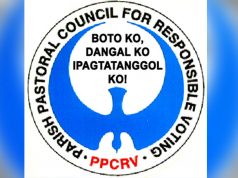
MANILA, Philippines – (UPDATE, 2:31 p.m) Leaders of the Senate and the House of Representatives have agreed to go ahead with the review of the 1987 Constitution and will come up with their respective proposals on the form of government and other provisions, House Majority Leader Rodolfo Fariñas said late Wednesday.
However, they have temporarily set aside discussions on the manner of voting, one of the sources of disagreement of the two chambers, and which had in past days brought them to a near-standoff.
“Congressional leaders have agreed to pursue the review of the 1987 Constitution by coming up with specific models and proposals in the form of actual constitutional provisions which hopefully could muster the required number of votes for these to be presented to the people in a plebiscite,” Farinas said in a text message to reporters.
“Once we agree on such, we will then discuss the manner of doing it,” he added.
Senate President Aquilino Pimentel III, Senate Majority Leader Vicente Sotto III, Speaker Pantaleon Alvarez and Fariñas were present during the meeting.
Senators and congressmen have expressed different positions on how they should vote once they sit as a constituent assembly.
Alvarez said it was clear in the constitution that a vote of three fourths of all Congress members is needed to approve the revised charter, which meant joint voting.
Pimentel and several senators, however, are for separate voting.
Fears that the supermajority of the administration’s allies in the House would ram through self-serving amendments – that in turn could lead to the lifting of term limits and to authoritarianism – were fanned by Alvarez’s recent insistence that with or without the senators, the House would vote on amendments. Once the House musters the number equivalent to three fourths of the combined number of senators and congressmen, regardless of whether just one or no senator participates, the draft would then be presented to the people in a plebiscite. This led several senators to say they won’t be bullied by the House into charter change amendments.
In a separate television interview on Thursday, Alvarez said, “Napagkasunduan namin na saka na lang namin pag-uusapan kung papano ang botohan. Mag-uusap muna kami sa detalye, halimbawa ‘yung structure nung government, hanggang mabuo namin ‘yung Saligang Batas. Pagkatapos, kapag naman natapos kami ay [We agreed to defer discussions on the manner of voting. We will first discuss the details of the amendments, for instance, the structure of government, until we can finish the new draft Charter. When we’re done [it will not make any difference anymore if we vote separately or jointly].”
Asked if there was also a consensus on the need to shift to a federal form of government Alvarez replied, “Yes, po, tama po ‘yun [That’s right].” The meeting, according to Alvarez, was cordial.
“Well, so far, maganda naman ‘yung naging usapan namin at ‘yun, mahinahon naman lahat kami at napag-usapan nga kung ano yung maganda sa bayan, ay ‘yun ang aming prayoridad [The talks went well; we were all calm and civil and we said that what we felt is good for the nation gets priority] ,” he said.
He said a more detailed discussion of proposed features of the new federal form of government would be discussed in subsequent meetings of the congressional leaders, which would likely take place next week.
“May mga tinitingnan tayong proseso dito, kagaya halimbawa ‘yung modelo ng Amerika: iyan ‘yung federal bicameral. Yun namang modelo ng Germany yata, ‘yun naman federal pero unicameral. So pinag-aaralan natin kung saan tayo dito magkakasundo [We’re looking at the processes here–for instance, the American model is federal bicameral. The German model is federal but unicameral. So, we’re discussing the grounds we could agree on],” Alvarez said.









